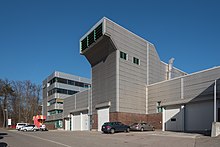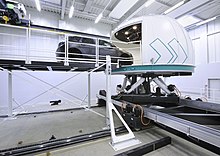Research Institute for Automotive and Vehicle Engines Stuttgart
The Research Institute for Automotive Engineering and Vehicle Engines Stuttgart ( FKFS ) was founded in 1930 as an independent research institute and has since been active as an engineering service provider and partner to the international automotive and supplier industry. The business areas are automotive, automotive mechatronics and vehicle drives.
The institute is an independent foundation under civil law based in Stuttgart . The FKFS works closely with the Institute for Vehicle Technology Stuttgart IFS at the University of Stuttgart .
Focus of work
| Automotive | Automotive mechatronics | Vehicle drives |
|---|---|---|
| Vehicle aerodynamics and thermal management | electronics | Thermodynamics and combustion processes |
| Vehicle acoustics and vibrations | software | Exhaust gas analysis and development tools |
| Vehicle technology and driving dynamics | mobility | Engine acoustics and engine mechanics |
| Cross-sectional projects and high performance computing | Test bench technology | |
| Wind tunnel operation | 0D / 1D simulation / 3D CFD simulation |
Board
One board member is responsible for the areas of automotive engineering (since March 1, 2019, Andreas Wagner), automotive mechatronics (since 2004: Hans-Christian Reuss ) and vehicle drives (since 1998: Michael Bargende ).
Services
Around 180 employees carry out research and development projects in the areas of drive systems, vehicles, vehicle mechatronics and electromobility. The annual turnover in 2018 was around 27 million euros.
The research institute has a large number of highly specialized test stands. In-house measurement, testing and simulation processes developed at the FKFS enable the solution of complex problems in automotive development. The institute operates an aeroacoustic 1: 1 vehicle wind tunnel that was comprehensively modernized in 2014 - one of the most modern in the world - with road driving simulation using a 5-band system as well as a 1: 4 and 1: 5 model wind tunnel, which are also equipped with road driving simulation. A thermal wind tunnel and special measuring vehicles allow vehicle dynamics and pollution investigations as well as measurements of driving performance and consumption. A servo-hydraulic 4-piston test bench, a vehicle noise test bench and a laser scanning vibrometer are available for investigations into vehicle acoustics and vibrations.
Europe's largest driving simulator at a research facility was put into operation in 2014.
In the field of vehicle drives, 19 standard and non-stationary test benches are available, the performance spectrum of which ranges from a small engine test bench with 12 kW and 30,000 rpm to a commercial vehicle engine test bench with 700 kW and 3,700 rpm. In addition, the institute has a powertrain and hybrid test bench with on-board network simulation that was inaugurated in 2010. Test systems for networked automotive electronics, control unit software development, development of simulators and new software tools are the main focuses of the automotive mechatronics division.
Since May 2019, the institute has had another high-performance electric drive train test bench and, together with the Institute for Internal Combustion Engines and Automotive Engineering IVK at the University of Stuttgart, operates a hybrid engine test bench and a vehicle dynamics test bench.
Publicly and self-financed research activities as well as direct involvement in teaching activities at the University of Stuttgart complement the tasks of the institute.
history
In 1930, Wunibald Kamm , the first professor for automotive engineering and vehicle engines at the Technical University of Stuttgart, founded the private and non-profit research institute for automotive engineering and vehicle engines Stuttgart - FKFS. With the K-Wagen he developed the prototype of an aerodynamically innovative passenger car and built the first 1: 1 wind tunnel for motor vehicles.
After 1945 the institute was rebuilt under Kamm's successor, Paul Riekert. After the damage from the Second World War had been repaired, the wind tunnel could be used by the automotive industry. This was a decisive contribution to Germany's leading position in the field of vehicle aerodynamics. Riekert continued his work on vehicle dynamics and developed the Stuttgart friction meter to measure the grip of the tire-road combination.
In 1971, Ulf Essers took over the chair for automotive engineering and vehicle engines at the University of Stuttgart and also became director of the FKFS. In addition to his research and teaching duties, he planned the new institute building on the university campus in Stuttgart-Vaihingen. The rooms were occupied in 1978 and expanded in 1988 to include a wind tunnel system with a model wind tunnel and a vehicle wind tunnel. Essers founded the new research focus on noise reduction in vehicles and engines . In addition to numerous projects to reduce noise in engines and tires, several low-noise commercial vehicles were developed and presented in prototypes. In 1993 the vehicle wind tunnel was upgraded to an aeroacoustic tunnel, making it the most powerful aeroacoustic vehicle wind tunnel in Europe.
In 1998, Jochen Wiedemann took over the chair of automotive engineering as the successor to Essers. In the same year Michael Bargende was appointed to the Chair of Internal Combustion Engines ( vehicle drives since 2011 ). The desired addition was made when Hans-Christian Reuss took over the chair in automotive mechatronics in 2004. Andreas Wagner has held the chair in automotive engineering since April 2019. He succeeds Jochen Wiedemann, who retired at the end of March 2019. The three professors are board members of the FKFS, the chair changes every two years.
literature
- Research Institute for Automotive and Vehicle Engines Stuttgart FKFS (Ed.): 75 years of FKFS - a review. A chronicle of the Research Institute for Automotive Engineering and Vehicle Engines Stuttgart on the occasion of its 75th anniversary 1930–2005 . Researched and edited by Jürgen Potthoff and Ulf Essers with contributions by Helmut Maier and Ute Grau / Barbara Guttmann. FKFS, Stuttgart 2005, ISBN 3-924860-30-0
Web links
Individual evidence
- ↑ FKFS: Research In Motion: Organigramm. Retrieved May 15, 2019 .
- ↑ FKFS: Research In Motion: Home. Retrieved May 15, 2019 .
Coordinates: 48 ° 44 '59.6 " N , 9 ° 6' 50.4" E



